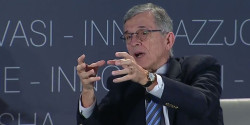On Wednesday FCC Chairman Tom Wheeler stunned many at the Consumer Electronics Show in Las Vegas by announcing that the agency will move to reclassify broadband internet as a utility. During an on-stage conversation with Consumer Electronics Association President Gary Sharpiro, Wheeler said that new rules based under so-called Title II provisions would be circulated to commissioners beginning February 5, with a vote scheduled for February 26.
In May of last year the FCC released an Open Internet proceeding that proposed a standard of “commercially reasonable” for judging whether or not particular types of internet traffic discrimination would be permissible. At the time I judged the strategy to be “half-baked” and likely to create a two-tiered internet, with a fast-lane for big companies that can pay to deliver their data to consumers, and a slow-lane for smaller players–like independent radio stations–that can’t afford to pay the toll.
At CES Wheeler explained the new embrace of Title II came about because, “it became obvious that commercially reasonable could be interpreted as what is reasonable for the ISPs, not what’s reasonable for the consumers or innovators. And that’s the wrong question and the wrong answer.”
The new standard is “just and reasonable,” which he said is “a Title II concept.” Although the broadband industry strongly opposes Title II, Wheeler said that wireless has been regulated under that regime, and it’s worked out well.
Although the terms “just and reasonable” may seem just as arbitrary as “commercially reasonable,” they are actually terms of art with a decades-long history in court precedent and regulatory action. Put most simply, “just and reasonable” means that the interest of the consumer and the service provider should be balanced out fairly. How the Commission intends to effect that with internet service is still to be revealed.
Internet openness affects radio of all kinds, from terrestrial broadcasters with web streams to innovative new producers taking advantage of the internet’s global reach. That’s why web radio broadcasters, radio hosts and fans were amongst the more than a million Americans who filed comments with the FCC asking the agency to create strong protections for network neutrality.
As with all policy matters, the devil is often in the details, and the details of Wheeler’s new Open Internet proposal are not known yet. However, there is cautious optimism amongst net neutrality advocates. Free Press President Craig Aaron said, “The chairman appears to have finally heard the demands of the millions of Internet users who have called for real Net Neutrality protections.”
In a blog post Future of Music Coalition CEO Casey Rae said, “FMC is pleased that the perspectives of thousands of musicians and independent labels going back to 2007 have been taken into account.”
Massachussetts Senator Ed Markey, who authored the first net neutrality bill to be introduced into Congress, released a statement saying, “I am pleased to hear that Chairman Wheeler is being guided by Title II on the FCC’s path toward new open Internet rules. The best way to prevent the broadband behemoths from erecting online tollbooths and undermining the openness of the Internet is to reclassify broadband under Title II. Net neutrality is just a fancy term for nondiscrimination, and it is the democratic foundation of the Internet that the FCC must preserve in order to maintain online freedom.”



